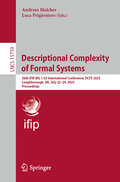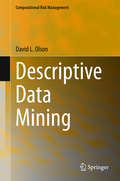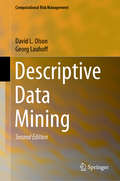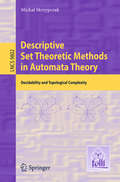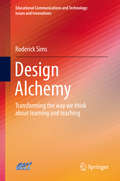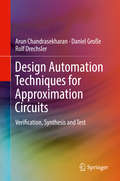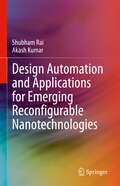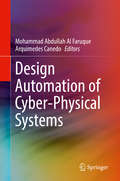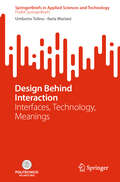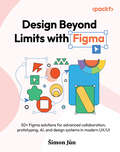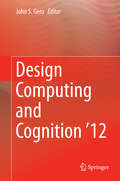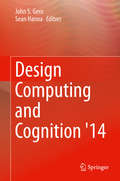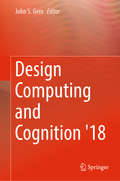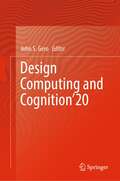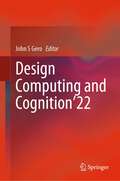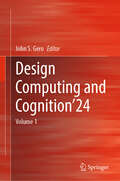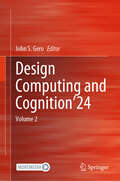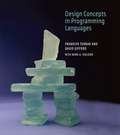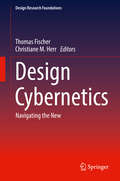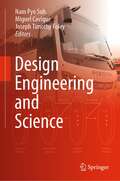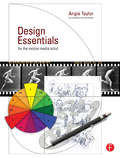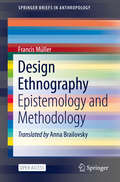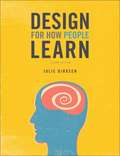- Table View
- List View
Descriptional Complexity of Formal Systems: 25th IFIP WG 1.02 International Conference, DCFS 2023, Potsdam, Germany, July 4–6, 2023, Proceedings (Lecture Notes in Computer Science #13918)
by György Vaszil Henning Bordihn Nicholas TranThis book constitutes the proceedings of the 25th International Conference on Descriptional Complexity of Format Systems, DCFS 2023, which took place in Potsdam, Germany, in July 2023.The 14 full papers, including one invited presentation as a full paper, presented in this volume were carefully reviewed and selected from 16 submissions. The conference focus on all aspects of descriptional complexity, including automata, grammars, languages, and other formal systems; various modes of operations and complexity measures.
Descriptional Complexity of Formal Systems: 26th IFIP WG 1.02 International Conference, DCFS 2025, Loughborough, UK, July 22–24, 2025, Proceedings (Lecture Notes in Computer Science #15759)
by Andreas Malcher Luca PrigionieroThis book constitutes the refereed proceedings of the 26th IFIP WG 1.02 International Conference on Descriptional Complexity of Formal Systems, DCFS 2025, held in Loughborough, UK, during July 22–24, 2025. This book includes 15 full papers, carefully reviewed and selected from 20 submissions, as well as 4 abstracts of the invited talks. The conference focus on all aspects of descriptional complexity, including automata, grammars, languages, and other formal systems; various modes of operations and complexity measures.
Descriptive Data Mining
by David L. OlsonThis book offers an overview of knowledge management. It starts with an introduction to the subject, placing descriptive models in the context of the overall field as well as within the more specific field of data mining analysis. Chapter 2 covers data visualization, including directions for accessing R open source software (described through Rattle). Both R and Rattle are free to students. Chapter 3 then describes market basket analysis, comparing it with more advanced models, and addresses the concept of lift. Subsequently, Chapter 4 describes smarketing RFM models and compares it with more advanced predictive models. Next, Chapter 5 describes association rules, including the APriori algorithm and provides software support from R. Chapter 6 covers cluster analysis, including software support from R (Rattle), KNIME, and WEKA, all of which are open source. Chapter 7 goes on to describe link analysis, social network metrics, and open source NodeXL software, and demonstrates link analysis application using PolyAnalyst output. Chapter 8 concludes the monograph. Using business-related data to demonstrate models, this descriptive book explains how methods work with some citations, but without detailed references. The data sets and software selected are widely available and can easily be accessed.
Descriptive Data Mining (Computational Risk Management)
by David L. Olson Georg LauhoffThis book provides an overview of data mining methods demonstrated by software. Knowledge management involves application of human knowledge (epistemology) with the technological advances of our current society (computer systems) and big data, both in terms of collecting data and in analyzing it. We see three types of analytic tools. Descriptive analytics focus on reports of what has happened. Predictive analytics extend statistical and/or artificial intelligence to provide forecasting capability. It also includes classification modeling. Diagnostic analytics can apply analysis to sensor input to direct control systems automatically. Prescriptive analytics applies quantitative models to optimize systems, or at least to identify improved systems. Data mining includes descriptive and predictive modeling. Operations research includes all three. This book focuses on descriptive analytics.The book seeks to provide simple explanations and demonstration of some descriptive tools. This second edition provides more examples of big data impact, updates the content on visualization, clarifies some points, and expands coverage of association rules and cluster analysis. Chapter 1 gives an overview in the context of knowledge management. Chapter 2 discusses some basic software support to data visualization. Chapter 3 covers fundamentals of market basket analysis, and Chapter 4 provides demonstration of RFM modeling, a basic marketing data mining tool. Chapter 5 demonstrates association rule mining. Chapter 6 is a more in-depth coverage of cluster analysis. Chapter 7 discusses link analysis. Models are demonstrated using business related data. The style of the book is intended to be descriptive, seeking to explain how methods work, with some citations, but without deep scholarly reference. The data sets and software are all selected for widespread availability and access by any reader with computer links.
Descriptive Set Theoretic Methods in Automata Theory
by Michał SkrzypczakThe book is based on the PhD thesis Descriptive Set Theoretic Methods in Automata Theory, awarded the E. W. Beth Prize in 2015 for outstanding dissertations in the fields of logic, language, and information. The thesis reveals unexpected connections between advanced concepts in logic, descriptive set theory, topology, and automata theory and provides many deep insights into the interplay between these fields. It opens new perspectives on central problems in the theory of automata on infinite words and trees and offers very impressive advances in this theory from the point of view of topology. " the thesis of Micha Skrzypczak offers certainly what we expect from excellent mathematics: new unexpected connections between a priori distinct concepts, and proofs involving enlightening ideas. Thomas Colcombet. "
Design Alchemy
by Roderick SimsThe promise of online learning--flexible, learner-centered, responsive--was forward-looking and poised to revolutionize education. But too often online learning courses have little room for student engagement and their design does not reflect the potential for interactive and collaborative learning. Design Alchemy counters this trend by synthesizing the art and science of educational design to model a whole that transcends the sum of its parts. Challenging yet accessible, it clearly sets out steps for harnessing innovative strategies and designer creativity to provide educational platforms that reduce learner boredom and instructor burnout, and encourage deeper interaction with subject matter. Activities, assessment methods, and sample course materials are designed toward improving quality, embracing diversity, and adapting positively to change. And the book's palette of resources enables readers to effectively apply the principles in their own practice: The evolution of Design Alchemy in the context of online learning. Alignment with core theories and practice models. The framework: elements of pedagogy and components of practice. Case studies showing Design Alchemy in real-world learning. Tools, templates, and a sample syllabus. The Design Alchemy Manifesto, summarizing key ideas. Researchers and practitioners in technology and education will look to Design Alchemy as a transformative work to help make the most of student potential, learning opportunities, and their own professional growth.
Design Automation Techniques for Approximation Circuits: Verification, Synthesis and Test
by Rolf Drechsler Arun Chandrasekharan Daniel GroßeThis book describes reliable and efficient design automation techniques for the design and implementation of an approximate computing system. The authors address the important facets of approximate computing hardware design - from formal verification and error guarantees to synthesis and test of approximation systems. They provide algorithms and methodologies based on classical formal verification, synthesis and test techniques for an approximate computing IC design flow. This is one of the first books in Approximate Computing that addresses the design automation aspects, aiming for not only sketching the possibility, but providing a comprehensive overview of different tasks and especially how they can be implemented.
Design Automation and Applications for Emerging Reconfigurable Nanotechnologies
by Akash Kumar Shubham RaiThis book is a single-source solution for anyone who is interested in exploring emerging reconfigurable nanotechnology at the circuit level. It lays down a solid foundation for circuits based on this technology having considered both manual as well as automated design flows. The authors discuss the entire design flow, consisting of both logic and physical synthesis for reconfigurable nanotechnology-based circuits. The authors describe how transistor reconfigurable properties can be exploited at the logic level to have a more efficient circuit design flow, as compared to conventional design flows suited for CMOS. Further, the book provides insights into hardware security features that can be intrinsically developed using the runtime reconfigurable features of this nanotechnology.
Design Automation of Cyber-Physical Systems
by Mohammad Abdullah Al Faruque Arquimedes CanedoThis book presents the state-of-the-art and breakthrough innovations in design automation for cyber-physical systems.The authors discuss various aspects of cyber-physical systems design, including modeling, co-design, optimization, tools, formal methods, validation, verification, and case studies. Coverage includes a survey of the various existing cyber-physical systems functional design methodologies and related tools will provide the reader unique insights into the conceptual design of cyber-physical systems.
Design Behind Interaction: Interfaces, Technology, Meanings (SpringerBriefs in Applied Sciences and Technology)
by Ilaria Mariani Umberto TolinoThis book investigates how digital transformation and technological innovations are challenging traditional design paradigms and redefining the conception of interfaces, suggesting a future where interfaces seamlessly integrate into or disappear within smart objects. Through the lens of Thingk, a university spin-off of the Politecnico di Milano, it addresses the practical application of theoretical design research in creating objects that, while analog in appearance, are technologically augmented, embracing a multidisciplinary approach that includes product design, communication, and interaction design. Covering an eight-year span of experimental design and analysis, it dives into how smart objects leverage context-awareness and situated meanings, engaging users from research and co-creation to validation. The significance of this book lies in its comprehensive analysis and insights into the design process behind such objects, underscoring the need for thorough examination of how semantic reconfigurations impact on affordances and agency. With a strong emphasis on a research-through-design approach and case studies, it bridges theoretical inquiry with practical applications, offering insights into the potentials of design-driven innovation in evolving user experiences.
Design Better and Build Your Brand in Canva: A beginner's guide to producing professional branding, marketing, and social content for businesses
by Laura Goodsell Janine Friston Heather PalfreymanDiscover everything you need to get started with Canva, create a brand, and easily design professional-looking graphics to go from zero to pro in no timeKey FeaturesOrganize your business designs using folders and learn to schedule social media content in Canva's own content plannerLearn to create presentations, as well as video and animated social media postsDiscover the features of Canva to help you save time, including the brand kit, quick create and templatesBook DescriptionIf you're constantly frustrated by how long it takes to create a design in Canva, then you've come to the right place. This book will get you up and running quickly with creating professional branded graphics in Canva. You'll learn how to set up a Canva account, both free and pro and create a brand kit while understanding the importance of branding. Next, you'll discover all the features and tools as well as how to put everything together to build a brand you love and graphics that work for your business. As you progress, the chapters will show you how to organize your account, create presentations, use videos and animation within your marketing materials and more. By the end of this book, you'll have a solid understanding of what Canva is and what it does and be able to confidently and easily create a branded design from scratch.What you will learnUnderstand the fundamental capabilities and features of CanvaCreate a brand kit and understand what makes a good brandDevelop effective graphics to aid in increasing visibility on social media platformsFollow step-by-step tutorials to create stunning designsCreate a branded logo and learn about trademark and copyright guidelinesDiscover a world of color combinations, contrasts, and meanings for your brandExplore the fundamental design principlesUse videos, animation, and sounds in social graphics for your designsWho this book is forThis book is for aspiring designers, social media managers, VAs, service-based businesses and solopreneurs with basic experience in Canva, who are looking to advance in a new skill, while creating their brand and perfecting their social and marketing materials on a budget. A basic understanding of Canva, including setting up a free Canva account, creating a basic design using a template, adding images and text boxes and changing the color of fonts will be helpful but not essential.
Design Beyond Limits with Figma: 50+ Figma solutions for advanced collaboration, prototyping, AI, and design systems in modern UX/UI
by Šimon JůnBecome a pro Figma user by learning advanced techniques, real-world workflows from experts, and Al tips that make collaboration and handoffs effortlessKey FeaturesLevel up into a highly sought-after designer through expert techniques and battle-tested workflowsLearn faster with a hands-on guide built around practical, recipe-based approach.Put Al to work in Figma with workflows that speed up content, assets, and cleanup while saving hoursPurchase of the print or Kindle book includes a free PDF eBookBook DescriptionFigma isn’t just a design tool; it’s the modern designer’s command center Šimon Jun, COO at Dotidot, longtime Figma lecturer, and organizer of the Czech Friends of Figma community, built this book from the trenches of real product work. After years of untangling messy files, rescuing failing handoffs, and coaching teams at scale, he distilled what actually works into a practical, recipe-driven guide. Over time, Šimon saw the same problems show up again and again: bloated files, broken handoffs, and design systems that couldn’t scale. This book is his way of sharing the patterns, tools, and habits that helped teams move past those roadblocks and build stronger, more connected design processes in Figma. Inside, you’ll learn how to structure files for real collaboration, use design tokens without chaos, build accessible, scalable libraries, and hand off to developers with confidence. You’ll see how to automate repetitive work with plugins and AI, run async reviews, and bake feedback loops into your process so projects keep moving, without losing polish.What you will learnMaster advanced collaboration workflows to reduce rework and keep design projects moving.Build scalable design systems with tokens, variables, and accessible components.Deliver clean handoffs using specs, annotations, exports, and Dev Mode.Create accessible systems that meet WCAG standards and work at scale.Engage stakeholders effectively through clear reviews and interactive presentations.Leverage plugins and AI to automate tasks and accelerate design work.Who this book is forThis book is written for UX and UI designers who already have a basic understanding of Figma and want to advance beyond the fundamentals. Product managers and developers who work closely with design teams will also benefit from learning design practices, building scalable systems and better collaboration practices.
Design Computing and Cognition '12
by John S. GeroDesign thinking, the label given to the acts of designing, has become a paradigmatic view that has transcended the discipline of design and is now widely used in business and elsewhere. As a consequence there is an increasing interest in design research. This is because of the realization that design is part of the wealth creation of a nation and needs to be better understood and taught. The continuing globalization of industry and trade has required nations to re-examine where their core contributions lie if not in production efficiency. Design is a precursor to manufacturing for physical objects and is the precursor to implementation for virtual objects. At the same time, the need for sustainable development requires the design of new products and processes, which feeds a movement towards design innovations and inventions. The papers in this volume are from the Fifth International Conference on Design Computing and Cognition (DCC'12) held at Texas A & M University, USA. They represent the state-of-the-art of research and development in design computing and design cognition. They are of particular interest to researchers, developers and users of advanced computation in design and those who need to gain a better understanding of designing.
Design Computing and Cognition '14
by John S. Gero Sean HannaThis book details the state-of-the-art of research and development in design computing and design cognition. It features more than 35 papers that were presented at the Sixth International Conference on Design Computing and Cognition, DCC'14, held at University College, London, UK. Inside, readers will find the work of expert researchers and practitioners that explores both advances in theory and application as well as demonstrates the depth and breadth of design computing and design cognition. This interdisciplinary coverage, which includes material from international research groups, examines design synthesis, design cognition, design creativity, design processes, design theory, design grammars, design support and design ideation. Overall, the papers provide a bridge between design computing and design cognition. The confluence of these two fields continues to build the foundation for further advances and leads to an increased understanding of design as an activity whose influence continues to spread. As a result, the book will be of particular interest to researchers, developers and users of advanced computation in design and those who need to gain a better understanding of designing that can be obtained through empirical studies.
Design Computing and Cognition ’18
by John S. GeroThis is the proceedings of the Eighth International Conference on Design Computing and Cognition (DCC’18) held at the Polytecnico di Milano in Italy. This volume presents both advances in theory and applications and demonstrates the depth and breadth of design computing and design cognition. Design thinking, the label given to the acts of designing, has become a paradigmatic view that has transcended the discipline of design and is now widely used in business and elsewhere. As a consequence there is an increasing interest in design research. This volume contains papers that represent the state-of-the-art research and developments in design computing and design cognition. This book is of particular interest to researchers, developers and users of advanced computation in design and those who need to gain a better understanding of designing that can be obtained through empirical studies.
Design Computing and Cognition’20
by John S. GeroThe papers in this volume are from the Ninth International Conference on Design Computing and Cognition (DCC’20) held virtually at the Georgia Institute of Technology, Atlanta, USA. They represent the state-of-the-art of research and development in design computing and design cognition including the increasingly active area of design cognitive neuroscience. They are of particular interest to design researchers, developers and users of advanced computation in designing as well as to design educators. This volume contains knowledge about the cognitive behavior of designers, which is valuable for those who need to gain a better understanding of designing.
Design Computing and Cognition’22
by John S GeroThis book reports research and development that represent the state of the art in artificial intelligence in design, design cognition, design neurocognition, and design theories from the Tenth International Conference on Design Computing and Cognition held in Glasgow, UK, in 2022. The 48 chapters are grouped under the headings of natural language processing and design; design cognition; design neurocognition; learning and design; creative design and co-design; shape grammars; quantum computing; and human behavior. These contributions are of particular interest to design researchers and design educators, as well as to users of advanced computation and cognitive science. This book contains knowledge about the cognitive and neurocognitive behavior of designers, which is valuable to those who need to gain a better understanding of designing.
Design Computing and Cognition’24: Volume 1
by John S. GeroThis book publishes the reviewed and revised texts of the papers delivered at the Eleventh International Conference on Design Computing – DCC’24 held at Concordia University in Montreal, Canada. These papers span the range of design research from artificial intelligence, cognitive science, cognitive neuroscience to computational theories applies to design. The papers are published in two volumes and are grouped under the following headings: Design Processes, Design Creativity, Design Cognition, Shape and Form, Design Technology, AI and Design, Design and Brain Behaviors, and Design AI Applications. These two volumes form an archival record of current cutting-edge research studying design scientifically. They demonstrate the range of approaches being used to characterize designing as a process. At the same time they show that there is a commonality in designing independent of design discipline. These volumes will be of interest to design researchers in both academia and industry and to anyone who needs to obtain a better understanding of designing.
Design Computing and Cognition’24: Volume 2
by John S. GeroThis book publishes the reviewed and revised texts of the papers delivered at the Tenth International Conference on Design Computing – DCC’24 held at Concordia University in Montreal, Canada. These papers the range of design research from artificial intelligence, cognitive science, cognitive neuroscience and computational theories applies to design. The papers are published in two volumes and are grouped under the following headings: Design Processes, Design Creativity, Design Cognition, Shape and Form, Design Technology, AI and Design, Design and Brain Behaviors, and Design AI Applications. These two volumes form an archival record of then current cutting-edge research studying design scientifically. They demonstrate the range of approaches being used to characterize designing as a process. At the same time they show that there is a commonality in designing independent of design discipline. These volumes will be of interest to design researchers in both academia and industry and to anyone who needs to obtain a better understanding of designing.
Design Concepts in Programming Languages
by Franklyn Turbak David Gifford Mark A. SheldonChoice Outstanding Academic Title, 2009. Hundreds of programming languages are in use today--scripting languages for Internet commerce, user interface programming tools, spreadsheet macros, page format specification languages, and many others. Designing a programming language is a metaprogramming activity that bears certain similarities to programming in a regular language, with clarity and simplicity even more important than in ordinary programming. This comprehensive text uses a simple and concise framework to teach key ideas in programming language design and implementation. The book's unique approach is based on a family of syntactically simple pedagogical languages that allow students to explore programming language concepts systematically. It takes as its premise and starting point the idea that when language behaviors become incredibly complex, the description of the behaviors must be incredibly simple. The book presents a set of tools (a mathematical metalanguage, abstract syntax, operational and denotational semantics) and uses it to explore a comprehensive set of programming language design dimensions, including dynamic semantics (naming, state, control, data), static semantics (types, type reconstruction, polymporphism, effects), and pragmatics (compilation, garbage collection). The many examples and exercises offer students opportunities to apply the foundational ideas explained in the text. Specialized topics and code that implements many of the algorithms and compilation methods in the book can be found on the book's Web site, along with such additional material as a section on concurrency and proofs of the theorems in the text. The book is suitable as a text for an introductory graduate or advanced undergraduate programming languages course; it can also serve as a reference for researchers and practitioners.
Design Cybernetics: Navigating the New (Design Research Foundations)
by Thomas Fischer Christiane M. HerrDesign Cybernetics: Navigating the New Design cybernetics offers a way of looking at ourselves – curious, creative, and ethical humans – as self-organising systems that negotiate their own goals in open-ended explorations of the previously unknown. It is a theory of and for epistemic practices (learning, designing, researching) that is deeply committed to the autonomy of others and hence offers no prescriptive methodology. Design cybernetics describes design practice as inextricable from conversation – a way of enquiring, developing shared understanding and reaching the new that harnesses reliable control as well as error and serendipity. Recognising circular causality, observer-dependency and non-determinability, design cybernetics extends beyond tenets of scientific research into the creative, ethical and aesthetic domain. From this perspective, design is not an ill-conceived subset of scientific research. Instead, scientific research emerges as a particularly restricted subset of the broader human activity of design. This volume offers a cross-section of design cybernetic theory and practice with contributions ranging across architecture, interior lighting studies, product design, embedded systems, design pedagogy, design theory, social transformation design, research epistemology, art and poetics, as well as theatre and acting. Addressing designers, design educators and researchers interested in a rigorous, practice-based epistemology, it establishes design cybernetics as a foundational perspective of design research. “This is a conceptually elegant, well structured, and comprehensive presentation of design cybernetics. It fills a gap in the literature of the field.” Ken Friedman, Chair Professor, Tongji University “This book offers a valuable and timely introduction to second-order cybernetics as society grapples with complex issues like climate change and rising inequality.” Joichi Ito, Director of the MIT Media Lab
Design Engineering and Science
by Nam Pyo Suh Miguel Cavique Joseph Timothy FoleyDesign Engineering and Science teaches the theory and practice of axiomatic design (AD). It explains the basics of how to conceive and deliver solutions to a variety of design problems. The text shows how a logical framework and scientific basis for design can generate creative solutions in many fields, including engineering, materials, organizations, and a variety of large systems.Learning to apply the systematic methods advocated by AD, a student can construct designs that lead to better environmental sustainability and to increased quality of life for the end-user at the same time reducing the overall cost of the product development process. Examples of previous innovations that take advantage of AD methods include:• on-line electric vehicle design for electric buses with wireless power supply;• mobile harbors that allow unloading of large ships in shallow waters;• microcellular plastics with enhanced toughness and lower weight; and• organizational changes in companies and universities resulting in more efficient and competitive ways of working.The book is divided into two parts. Part I provides detailed and thorough instruction in the fundamentals of design, discussing why design is so important. It explains the relationship between and the selection of functional requirements, design parameters and process variables, and the representation of design outputs. Part II presents multiple applications of AD, including examples from manufacturing, healthcare, and materials processing.Following a course based on this text students learn to create new products and design bespoke manufacturing systems. They will gain insight into how to create imaginative design solutions that satisfy customer needs and learn to avoid introducing undue complexity into their designs. This informative text provides practical and academic insight for engineering design students and will help instructors teach the subject in a novel and more rigorous fashion. Their knowledge of AD will stand former students in good stead in the workplace as these methods are both taught and used in many leading industrial concerns.
Design Essentials for the Motion Media Artist: A Practical Guide to Principles & Techniques
by Angie TaylorMaster the fundamental concepts and techniques of motion media design so you can apply--and occasionally break--the rules to achieve your communication goals. This authoritative guide presents all of the design essentials in an engaging and inspiring way. Each principle is explained with text, illustration and photography where necessary. An accompanying website will contain any necessary digital files for download, updates and links to other resources.
Design Ethnography: Epistemology and Methodology (SpringerBriefs in Anthropology)
by Francis MüllerThis open access book describes methods for research on and research through design. It posits that ethnography is an appropriate method for design research because it constantly orients itself, like design projects, towards social realities. In research processes, designers acquire project-specific knowledge, which happens mostly intuitively in practice. When this knowledge becomes the subject of reflection and explication, it strengthens the discipline of design and makes it more open to interdisciplinary dialogue. Through the use of the ethnographic method in design, this book shows how design researchers can question the certainties of the everyday world, deconstruct reality into singular aesthetic and semantic phenomena, and reconfigure them into new contexts of signification. It shows that design ethnography is a process in which the epistemic and creative elements flow into one another in iterative loops. The goal of design ethnography is not to colonize the discipline of design with a positivist and objectivist scientific ethos, but rather to reinforce and reflect upon the explorative and searching methods that are inherent to it. This innovative book is of interest to design researchers and professionals, including graphic artists, ethnographers, visual anthropologists and others involved with creative arts/media.
Design For How People Learn (Voices That Matter)
by Julie DirksenIn this book, you will discover how to use the key principles behind learning, memory, and attention to create materials that enable your audience to both gain and retain the knowledge and skills you're sharing. Updated to cover new insights and research into how we learn and remember, this new edition includes new techniques for using social media for learning as well as two brand new chapters on designing for habit and best practices for evaluating learning, such as how and when to use tests. Using accessible visual metaphors and concrete methods and examples, this book will teach you how to leverage the fundamental concepts of instructional design both to improve your own learning and to engage your audience.

